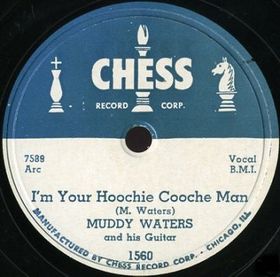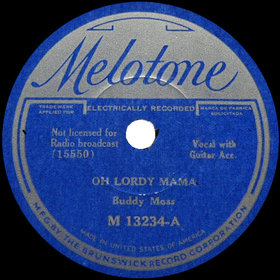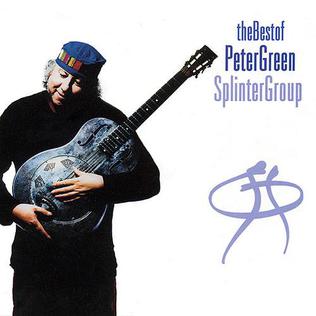
Elmore James was an American blues guitarist, singer, songwriter, and bandleader. Noted for his use of loud amplification and his stirring voice, James was inducted into the Rock and Roll Hall of Fame in 1992. His slide guitar technique earned him the nickname "King of the Slide Guitar".
Blues rock is a fusion genre and form of rock music that relies on the chords/scales and instrumental improvisation of blues. It is mostly an electric ensemble-style music with instrumentation similar to electric blues and rock. From its beginnings in the early to mid-1960s, blues rock has gone through several stylistic shifts and along the way it inspired and influenced hard rock, Southern rock, and early heavy metal.

Junior Wells was an American singer, harmonica player, and recording artist. He is best known for his signature song "Messin' with the Kid" and his 1965 album Hoodoo Man Blues, described by the critic Bill Dahl as "one of the truly classic blues albums of the 1960s". Wells himself categorized his music as rhythm and blues.

"Messin' with the Kid" is a rhythm and blues-influenced blues song originally recorded by Junior Wells in 1960. Chief Records owner/songwriter/producer Mel London is credited as the songwriter. Considered a blues standard, it is Junior Wells's best-known song. "Messin' with the Kid" was inducted into the Blues Hall of Fame and has been recorded by a variety of blues and other artists.

Soho Session is a live album by the British blues band the Peter Green Splinter Group, led by Peter Green. Released in 1999, this was their third album. Green was the founder of Fleetwood Mac and a member of that group from 1967–70, before a sporadic solo career during the late 1970s and early 1980s.
William McKinley "Jazz" Gillum was an American blues harmonica player.

"Dust My Broom" is a blues song originally recorded as "I Believe I'll Dust My Broom" by American blues artist Robert Johnson in 1936. It is a solo performance in the Delta blues-style with Johnson's vocal accompanied by his acoustic guitar. As with many of his songs, it is based on earlier blues songs, the earliest of which has been identified as "I Believe I'll Make a Change", recorded by the Sparks brothers as "Pinetop and Lindberg" in 1932. Johnson's guitar work features an early use of a boogie rhythm pattern, which is seen as a major innovation, as well as a repeating triplets figure.

"Hoochie Coochie Man" is a blues standard written by Willie Dixon and first recorded by Muddy Waters in 1954. The song makes reference to hoodoo folk magic elements and makes novel use of a stop-time musical arrangement. It became one of Waters' most popular and identifiable songs and helped secure Dixon's role as Chess Records' chief songwriter.
"One Way Out" is a blues song that was recorded in the early 1960s by both Sonny Boy Williamson II and Elmore James. A reworking of the song by G. L. Crockett, titled "It's a Man Down Here", appeared on the Billboard record charts in 1965. In 1971, the Allman Brothers Band recorded an updated live version of the song, which was included on their popular Eat a Peach album (1972).

Sweet Black Angel is an album recorded by blues pianist Pinetop Perkins and released in 1998. The title track is a cover of Robert Nighthawk's 1949 "Black Angel Blues ". That track was based on Lucille Bogan's, "Black Angel Blues" from 1930 B. B. King later covered "Sweet Black Angel" as, "Sweet Little Angel", in 1956.

Hoodoo Man Blues is the debut album of blues vocalist and harmonica player Junior Wells, performing with the Junior Wells' Chicago Blues Band, an early collaboration with guitarist Buddy Guy. Released on LP by Delmark Records in November 1965, the album has been subsequently reissued on CD and LP by Delmark and Analogue Productions.

"Bleeding Heart" is a song written and recorded by American blues musician Elmore James in 1961. Considered "among the greatest of James' songs", "Bleeding Heart" was later popularized by Jimi Hendrix, who recorded several versions of the song.

"Shake Your Moneymaker" or "Shake Your Money Maker" is a song recorded by Elmore James in 1961 that has become one of his best-known pieces. Inspired by earlier songs, it has been interpreted and recorded by several blues and other artists.

"Hey Lawdy Mama" is a Piedmont blues song recorded by Buddy Moss in 1934. The song became popular among jazz musicians with early recordings by Count Basie and Louis Armstrong. In 1943, a version recorded by Andy Kirk and His Twelve Clouds of Joy, with vocals by June Richmond, was a hit, reaching number four on the Billboard R&B chart.

Fathers and Sons is the seventh studio album by the American blues musician Muddy Waters, released as a double LP by Chess Records in August 1969.
"Early in the Morning" is a blues song that was recorded by Sonny Boy Williamson I in 1937. Identified as one of his most successful and influential tunes, it was inspired by earlier blues songs. "Early in the Morning" has been recorded by various musicians, including Junior Wells, who made it part of his repertoire.

The Best of Peter Green Splinter Group is a compilation album by the British blues band the Peter Green Splinter Group, led by Peter Green. Released in 2002, this was a two-disc set. Green was the founder of Fleetwood Mac and a member of that group from 1967–70, before a sporadic solo career during the late 1970s and early 1980s. This compilation was re-released in 2006.
"Hand Me Down My Walking Cane" is a song written by African-American James A. Bland in 1880. It has acquired the status of a folk song, and is cataloged as Roud Folk Song Index No. 11,733.

The Paul Butterfield Blues Band was an American blues rock band from Chicago, Illinois. Formed in the summer of 1963, the group originally featured eponymous vocalist and harmonicist Paul Butterfield, guitarist Elvin Bishop, bassist Jerome Arnold and drummer Sam Lay. The band added guitarist Mike Bloomfield and keyboardist Mark Naftalin before recording their eponymous debut album which was released in October 1965. The founding sextet were inducted into the Rock and Roll Hall of Fame in 2015, as was the second album (East-West) drummer Billy Davenport.














